The Checker Maven
The World's Most Widely Read Checkers and Draughts Publication
Bob Newell, Editor-in-Chief
Published every Saturday morning in Honolulu, Hawai`i
Noticing missing images? An explanation is here.
Drawbridge

The drawbridge goes back a long way. In medieval times, castles might be protected by a moat spanned by a drawbridge, which, if the castle were to be attacked, would be pulled up to deny access to the invaders. In the photo above, a more modern use of a drawbridge is shown; when a large vessel needs to cross the roadway, the bridge is pulled up to allow passage.
A bridge in checkers, of course, is something different. Bridge positions have been heavily analyzed. Whole books have been written about them. They certainly can be tricky.
Today's speed problem is about a bridge, and White is seeking a draw--- hence, it's a "drawbridge" position. It's not very difficult and is within range of the thoughtful novice. Old pros will see it right away.
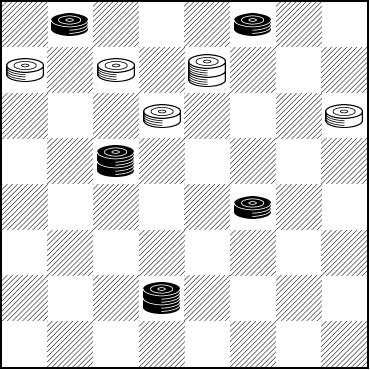
WHITE
White to Play and Draw
W:W5,6,K7,10,12:B1,3,K14,19,K26
Got it? Did you cross the bridge or was it a bridge too far? No matter. Cross your mouse over to Read More and click to verify your solution.![]()
No Problem Is A Problem?

In our modern world, things that are "no problem" are perceived by some to actually be a problem. The very phrase itself, "no problem" falls into this category. We are told by some "experts" that when we say something is "no problem" that's a negative statement, because it contains the word "problem" and will cause the listener to start thinking that there actually might be, or could have been, a problem.
We think this is a bit far-fetched and another example of people deliberately looking for a "problem."
Well, modern "experts" notwithstanding, we won't hesitate to say that today's speed problem is "no problem." Of course, it's a checker problem--- what else?--- but solving it should be no problem at all.
As always we like to provide a range of material for a range of checker playing abilities, from eager novice to aspiring amateur to advanced expert and even problems at the grandmaster level. Today's problem is at the novice level, but those of you with more advanced skills might wish to see how quickly you solve it. A skilled player should solve it in a mere couple of seconds, while a novice may have to think about it a little. But it's all to the good and hopefully a bit of checker fun.
So look below and start the (imaginary) clock! (We no longer utilize the Javascript clock on our site as some readers found it stressful or worse, non-functional.)
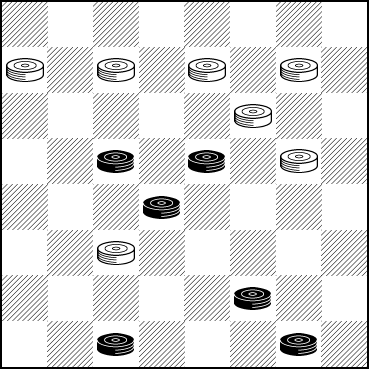
BLACK
Black to Play and Win
B:W11,17,22,25,26,27,28:B1,3,6,15,18,19
When you've got the solution, it will be no problem to click on Read More to double-check your answer.![]()
Theft! Problem Composing Contest 64

The fellow above is committing a felony and we sure hope he gets caught. The poor woman victim is going to have a nasty surprise, and a lot of headaches, when she realizes her wallet is gone, with all her cash, credit cards, and documents. Theft, especially from someone vulnerable, is truly reprehensible.
However, in our game of checkers theft might bring you praise instead of jail time, although the victim still isn't going to be happy. In this, the 64th of Bill Salot's amazing problem solving competitions, theft--- of the checker variety--- is the theme. You can access the contest problems here. Do try all the problems and be sure to vote for the one you think is best.
Mr. Salot sent us a "teaser" problem to introduce the concept.
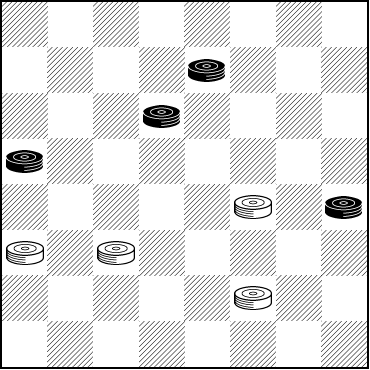
WHITE
White to Play and Win
W:W19,21,22,27:B7,10,13,20
A rather nice little challenge, so try it and don't rob yourself of some real solving pleasure. When you're done, you can steal a look at the solution by clicking on Read More.![]()
Labor Day 2022

Things have improved for the working person since last Labor Day. Unemployment is low and many employers are desperate to make hires. Wages are up at least a little, although inflation is a big worry and fingers crossed that there is no recession.
But we should always remember the reason for the Labor Day holiday, which is to recognize the millions of working people that have made and continue to make America a great nation. Without the hard workers who fill every conceivable kind of job and perform every conceivable type of task, where would we be? Each and every worker is important, and each and every worker deserves respect and recognition.
Checkers in the past has been thought of as the working person's mind game. We like that description. So to celebrate the day, as we always have in the past, we turn to an American problem composer, Tommie Wiswell, and a composition he calls All Around the Mulberry Bush.
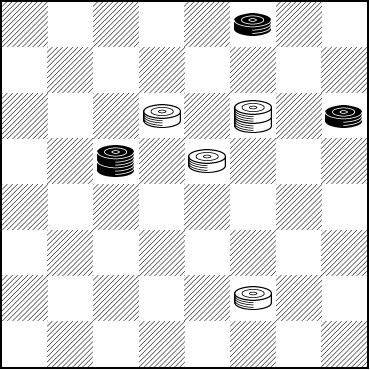
WHITE
White to Play and Win
W:W10,K11,15,27:B3,12,K14
We'll give you a small hint by saying it's the patient and careful worker that brings home the bacon. Work away at this one and see the fruits of your labor. Clicking on Read More will show you the solution.![]()
Easy As Pie
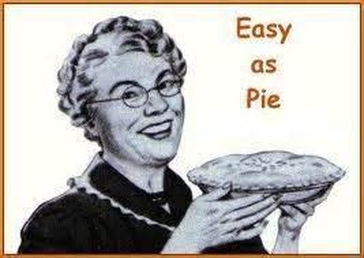
We've all heard the expression "easy as pie" to refer to something that is indeed very easy. But finding the origins of this expression is not quite as easy as pie.
There are a couple of theories. In 1855 the expression "nice as pie" appeared in print. In 1884 Mark Twain wrote "polite as pie." In 1886 "it's like eating pie" was found in Sporting Life. Finally in 1887 we see "it's as easy as pie" in the Newport Mercury.
Another idea traces back to pre-Reformation England, when the rules for computing the date of Easter were called "Pie." The theory goes on to speculate from the context that "Pie" originally meant something overly complicated and morphed into something that was in fact very easy. This seems a bit of a stretch.
And the most unusual idea of all relates the expression to the Maori word "pai" which means "good" and perhaps led to the Australian expression, in the 1920s, "pie at" or "'pie on" which meant "to be good at something" which was itself perhaps "easy as pie." This also seems a bit contrived.
We'll go with the explanations from the 1800s, and present a speed problem which is indeed as easy as pie.
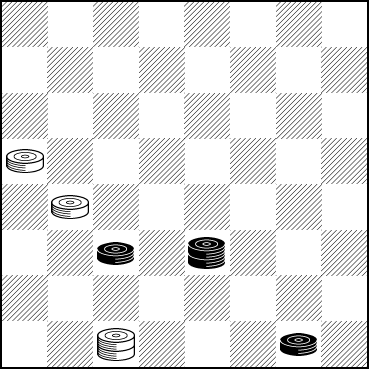
BLACK
Black to Play and Win
B:W20,16,K3:B11,1,K10
Most players will solve this instantly. See if you solve it at first glance. Novices may have to think a bit but also should be able to get it. No matter your status, treat yourself to a piece of pie after you've verified your solution by clicking on Read More.![]()
Problem Composing Contest 63: Mystery Theme

Who doesn't love a good mystery? Who, at one time or other hasn't fancied being a detective and coming up with the cleverly hidden solution to some heinous crime?
Today we're pleased to present a very special entry in Mr. Bill Salot's long-running series of outstanding checker problem composition contests, a series he calls the Unofficial World Championship. Each contest has featured a theme, but today, we're not revealing what it might be. It's a "mystery" theme. Can you solve all the problems and figure out the theme? Thankfully, no terrible crime has taken place but the mystery is nonetheless intriguing, fascinating, and perhaps even worthy of Mortimer Holmes himself (as featured in our series, The Checker Murders)!
To start you out, here's an example. Willie Ryan wrote that this problem, published by George H. Slocum in 1894, was "one of the most exquisite stroke problems on the record." The problems entered in Contest 63 demonstrate some of the same characteristics.
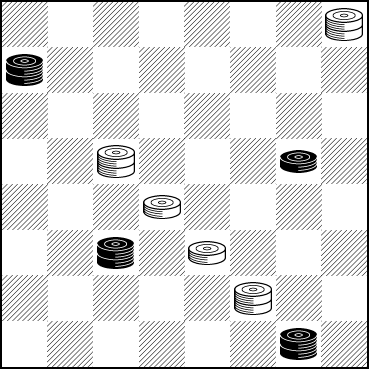
WHITE
White to Play and Win
W:WK4,K14,18,23,K27:BK5,16,K22,K32
Can you get it? You can always click on Read More to see the solution, but we won't give away the Mystery Theme. Be sure to go to the contest page to find our three challenging contest problems. Don't forget to cast your vote for the one you like best.![]()
PS-I or I-PS
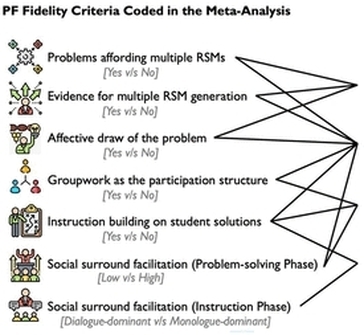
In today's Checker School column, we're going full-bore academic. Here's the abstract from a recent paper entitled When Problem Solving Followed by Instruction Works: Evidence for Productive Failure by Tanmay Sinha and Manu Kapur.
"When learning a new concept, should students engage in problem solving followed by instruction (PS-I) or instruction followed by problem solving (I-PS)? Noting that there is a passionate debate about the design of initial learning, we report evidence from a meta-analysis of 53 studies with 166 comparisons that compared PS-I with I-PS design. Our results showed a significant, moderate effect in favor of PS-I (Hedge's g 0.36 [95% confidence interval 0.20; 0.51]). The effects were even stronger (Hedge's g ranging between 0.37 and 0.58) when PS-I was implemented with high fidelity to the principles of Productive Failure (PF), a subset variant of PS-I design. Students' grade level, intervention time span, and its (quasi-)experimental nature contributed to the efficacy of PS-I over I-PS designs. Contrasting trends were, however, observed for younger age learners (second to fifth graders) and for the learning of domain-general skills, for which effect sizes favored I-PS. Overall, an estimation of true effect sizes after accounting for publication bias suggested a strong effect size favoring PS-I (Hedge's g 0.87)."
If you managed to follow all of that, you might wish to seek out the full paper, which is easily found on-line and is freely available. But what's this got to do with our game of checkers?
As it turns out, quite a bit. Should we study a concept in a checker book (like, for instance, fourth position) and then solve problems based on that theme? Or should we try some problems first, likely encountering failure, and only then go back and study the tutorial material? The paper suggests the latter for all but the youngest age groups.
Well, then, let's put this into practice, shall we? Here's a problem from Richard Pask's best-selling (in checker book terms, at least) Checkers for the Novice. If you're an expert player, you'll find the problem easy and you won't need the instruction. But for the rest of us --- what learning method will work best?
Choose your approach. See what resonates with you. You can actually experiment with the entire book, if you wish.
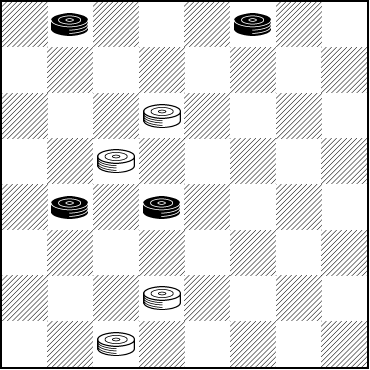
WHITE
White to Play and Win
W:W10,14,26,30:B1,3,17,18
We won't give the solution here; it's Diagram 57, part of Lesson 11 in Mr. Pask's book. If by any chance you don't have a copy, it's a free download.
So, what method did you choose? What was the easiest way for you to learn the concept demonstrated in this problem? Book first? Problem first? Do let us know what you think.![]()
4th of July 2022

Although this column is being written some weeks in advance, it looks as though 4th of July 2022 is going to be a vast improvement over the past Covid years. Although we know that Covid will never be completely gone, we're back to at least some semblance of normal, and there will be 4th of July parades and outdoor celebrations. And while the world situation and the economy could be better, we're happy for what we have, and most of all we're happy and proud to be Americans and we love celebrating the anniversary of our nation's independence.
On such holidays we often turn to another American patriot, the great champion Tommie Wiswell. Today we have a problem he called Blitz, and you'll see why when you solve it.
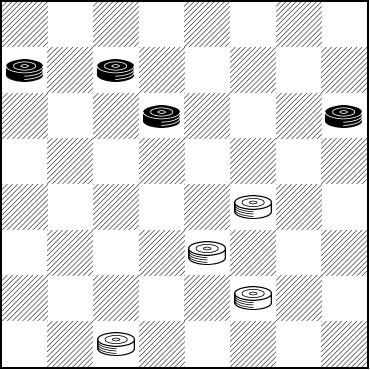
WHITE
White to Play and Win
W:W19,23,27,30:B5,6,10,12
See if you can win it. You don't have to play "blitz" --- take all the time you want, but when you're finished, definitely blitz your mouse over to Read More to see the solution.![]()
Bad Teacher

Bad Teacher was a terrible film from the year 2011. We certainly don't recommend it, but the idea does lead us nicely into today's Checker Maven column.
LARNER TRIES TO TEACH
"This is the way," said Larner impatiently as he persisted in rapidly solving a problem without giving the boastful Skittle a trial.
Galileo once said, "You cannot teach a man anything; you can only help him to find it within himself." How could Skittle learn without being permitted to make mistakes and then correct them?
Since 1775, due largely to the experiments of Johann Pestalozzi, the science of education has been based on problem solving or reasoning, rather than on memorizing. This Swiss educationalist combined manual with mental exercises. Teachers merely develop your latent power. You learn mainly by practice!
The preceding short selection is from Andrew J. Banks' eclectic book, Checker Board Strategy. It seems that Mr. Larner, whoever he was, is an example of a bad teacher. Is it true, for our game of checkers, that we learn mainly by practice, and that teachers merely develop our latent power?
That could be the subject of an extended and interesting debate. But for the moment, let's get some practice, with today's rather easy problem. It's really at the beginner level but more experienced players should see if they can solve it with just a quick glance.
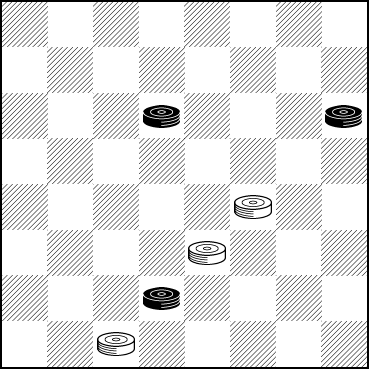
WHITE
White to Play and Win
W:W19,23,30:B10,12,26
Did you solve it rapidly? Did it provide any sort of useful practice? We surely don't have to teach you that you can click on Read More to verify your solution.![]()
The June Bug

It's the month of June and in some parts of North America it's the "June Bug" season. The June Bug is related to the scarab, and there are some 100 varieties of this insect. It makes a brief appearance usually in May and June each year, hence the name "June Bug" (or sometimes "May Bug"). They are widely considered to be a pest harmful to trees and lawn.
What's that got to do with checkers, and our (more or less) monthly speed problem? Take a look at the diagram below.
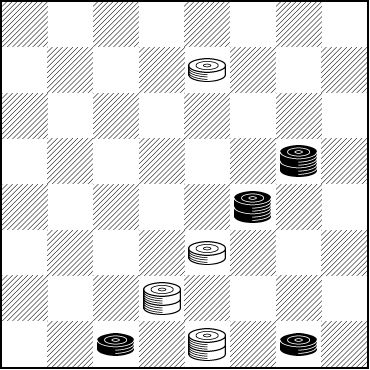
BLACK
Black to Play and Win
B:WK2,K7,10,26:B1,3,K14,K17
So, you say, it's pretty straightforward, right? What's the point of a problem with such an "obvious" solution? Well, then--- this one could indeed "bug" you if you get it wrong. Experienced players won't have any difficulty. But the rest of us might, shall we say, get, um, bitten[1].
Solve it quickly and then let your mouse crawl over to Read More to see the solution.
[1] June bugs don't actually bite humans, but allow us this small artistic liberty.![]()
The Checker Maven is produced at editorial offices in Honolulu, Hawai`i, as a completely non-commercial public service from which no profit is obtained or sought. Original material is Copyright © 2004-2025 Avi Gobbler Publishing. Other material is public domain, as attributed, or licensed under Creative Commons. Information presented on this site is offered as-is, at no cost, and bears no express or implied warranty as to accuracy or usability. You agree that you use such information entirely at your own risk. No liabilities of any kind under any legal theory whatsoever are accepted. The Checker Maven is dedicated to the memory of Mr. Bob Newell, Sr.

